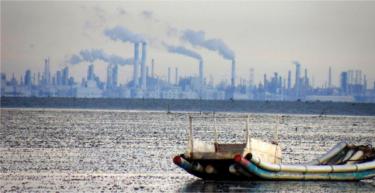Test results released yesterday show that the 380 residents of Changhua County’s Dacheng Township (大城) have higher levels of possibly carcinogenic heavy-metal pollutants in their urine than those of Yunlin County, where the nation’s sixth naphtha cracker is situated.
The tests, conducted by National Taiwan University professor Chan Chang-chuan (詹長權) on residents of Taisi (台西) and Dingjhuang (頂庄) villages in September and October last year respectively, are part of a project to trace the biological data of residents exposed to air pollutants.
At a briefing for residents yesterday, Chan said that all urine tests gave positive indications of 11 heavy metals.
Five of the 11 heavy metals detected — chromium, nickel, arsenic, cadmium and lead — are carcinogenic, Chan said.
The study showed that concentrations of eight heavy metals — vanadium, cadmium, manganese, nickel, arsenic, chromium, mercury and thallium — in the urine samples are higher than those taken from Mailiao (麥寮) and Taisi townships in Yunlin County during the same period. The townships are located within 10km of the naphtha cracker operated by the Formosa Plastics Group (FPG).
Concentrations of the heavy metals were between 1.3 and 2.4 times higher than those taken from Yunlin residents living outside the 10km range, the results showed.
In addition, concentrations of 1-hydroxyprene — a known carcinogen that is allegedly emitted by incinerators and coal-fired power plants in the complex — were significantly higher than those detected in urine samples of Yunlin residents living outside the 10km range, the results showed.
Chan told 228 residents who exhibited excessive levels of carcinogenic heavy metals or 1-hydroxyprene to consult doctors at Changhua Christian Hospital for follow-up health checks and risk assessments.
Using a mobile heavy metal air-quality monitoring system installed at Dingjhuang Elementary School, the study found that nickel and chromium concentrations were 1.4 and 4.5 times higher respectively than average values when the wind blows southeast.
Changhua County Environmental Protection Union Secretary-General Shih Yueh-ying (施月英), a resident of Taisi village, urged Changhua Commissioner Wei Ming-ku (魏明谷) to formally object to any further expansion of FPG’s naphtha cracker complex and to pressure the facility to reduce its emissions by asking it to stop burning petroleum coke and coal.
She said that county officials have acted passively in all matters related to the naphtha cracker, and avoided action by refusing to accept responsibility for the problem.
“Now that it is proven that the naphtha cracker does more harm to Changhua than to Yunlin, the Changhua County Government should adopt a proactive attitude and take part in all meetings regarding the site from now on,” she said.
She called on the county government to set up stationery heavy metal and air pollutant survey stations for long-term monitoring, as there are none in the county.



